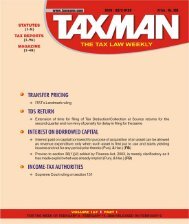CPT V24P7-Art1 (Content).pmd - Taxmann
CPT V24P7-Art1 (Content).pmd - Taxmann
CPT V24P7-Art1 (Content).pmd - Taxmann
You also want an ePaper? Increase the reach of your titles
YUMPU automatically turns print PDFs into web optimized ePapers that Google loves.
(c) Lease rental shall be paid at the rate of<br />
2.5% of the premium, which could be<br />
enhanced after 12 years of lease.<br />
In respect of premium paid, the assessee had<br />
been claiming it as revenue expenditure on<br />
pro rata basis over the life of lease since last<br />
15 years. The AO disallowed the same in the<br />
relevant year contending that the lease had<br />
enduring benefits over 90 years, thus, it had<br />
to be treated as capital expenditure. CIT(A)<br />
and ITAT upheld the order of AO.<br />
The High Court held in favour of revenue -<br />
The order of disallowance was upheld on the<br />
basis of following grounds:<br />
(a) Lease Premium is not an advance rent<br />
as held by the Supreme Court in CIT v.<br />
Madras Auto Service P. Ltd. [1998] 99 Taxman<br />
575;<br />
(b) Lease premium was paid by lessee to<br />
secure possession of the land, which was<br />
the pre-condition as well as the one-time<br />
consideration;<br />
(c) The lease was for 90 years which substantially<br />
and virtually created ownership right<br />
in favour of lessee;<br />
(d) The restrictions were consistent with the<br />
nature of asset created, i.e., leasehold right.<br />
Hence, amortization of lease premium could<br />
not be allowed. Further, the High Court held<br />
that blind adherence to the rule of consistency<br />
would lead to anomalous results. Also there<br />
can’t be wide application of the rule of consistency<br />
as the HC in its earlier ruling in a different<br />
case has held that the rule of consistency can’t<br />
be of inflexible application.<br />
Authorities can’t re-examine objects of<br />
a trust with a view to cancel its registration<br />
In Bombay Presidency Golf Club Ltd. v. DIT<br />
[2012] 23 taxmann.com 319 (Mum. - Trib.),<br />
assessee was a club and all activities of assessee<br />
were towards promotion of game of golf and<br />
}<br />
other ancillary activities carried were only<br />
incidental to said game only. The AO sent a<br />
proposal to the DIT(E) for cancellation of<br />
registration of assessee on the ground that the<br />
assessee had been carrying on activities in the<br />
nature of trade, commerce, business, etc.<br />
Therefore, it was hit by the first proviso to<br />
section 2(15) as amended by the Finance Act,<br />
2008, with effect from 1-4-2009. He, therefore,<br />
cancelled the registration of the assessee under<br />
section 12AA(3). It held that the assessee could<br />
not be held to be carrying out activities of<br />
charitable purposes and the assessee was directly<br />
hit by the first proviso to section 2(15), where<br />
there is a deeming provision that such an<br />
activity is not for charitable purposes.<br />
The Tribunal held in favour of assessee - It<br />
held that registration of assessee couldn’t be<br />
cancelled due to the following facts:<br />
(a) The activities of club were restricted amongst<br />
its members and all the activities were<br />
towards its objects and other ancillary<br />
activities were only incidental to said game<br />
only;<br />
(b) There was no evidence and material on<br />
record to show that activities of assessee<br />
were done on any business principle or<br />
assessee had been pursuing its business<br />
activities with reasonable continuity;<br />
(c) Expenditure of assessee was far more than<br />
receipts; and<br />
(d) Further be more, nowhere it had been<br />
brought on record that activities of assessee<br />
were not governed by principle of<br />
mutuality or it had been dealing with<br />
non-members.<br />
Amount received by trustee-cumbeneficiary<br />
on dissolution of trust is not<br />
‘gift’ to be taxed under section 56<br />
In Ashok C. Pratap v. Addl. CIT [2012] 23<br />
taxmann.com 347 (Mum. - Trib.), the trustees<br />
were the parents and the beneficiaries were<br />
August 1 to 15, 2012 u TAXMANN’S CORPORATE PROFESSIONALS TODAY u Vol. 24 u 69<br />
}<br />
689











![“FORM NO. 3CEB [See rule 10E] Report from an ... - Taxmann](https://img.yumpu.com/45480232/1/190x245/form-no-3ceb-see-rule-10e-report-from-an-taxmann.jpg?quality=85)





